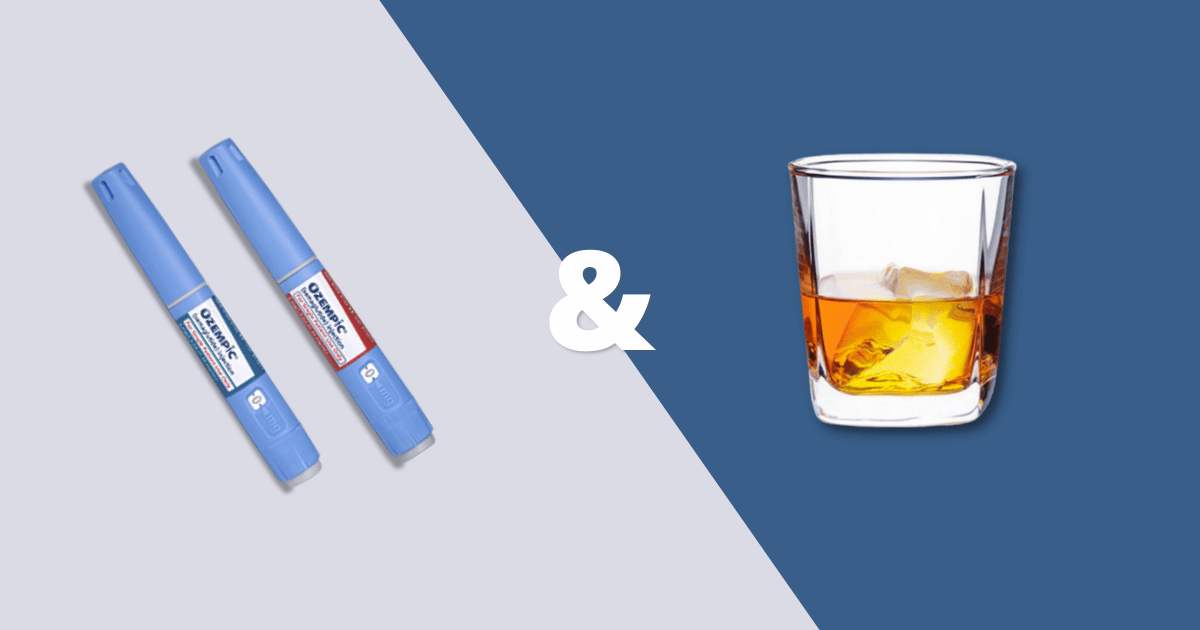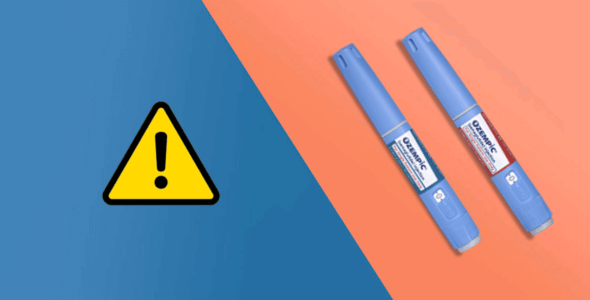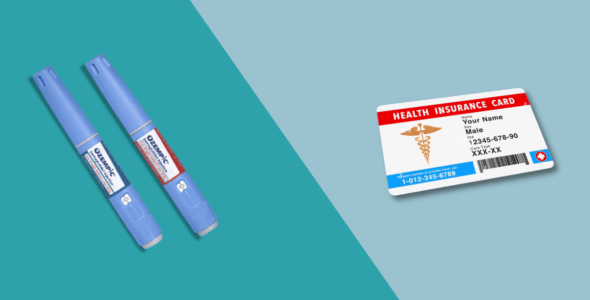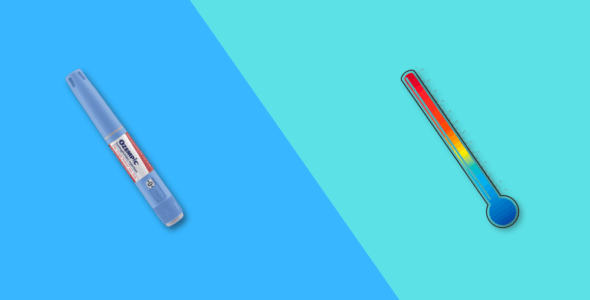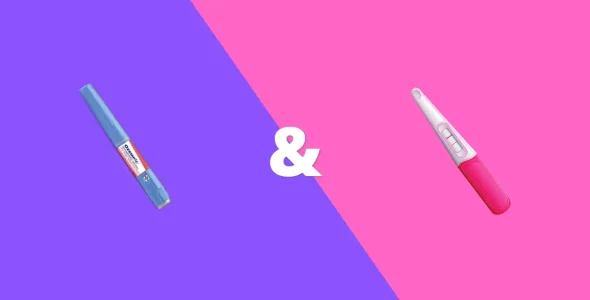Ozempic and alcohol: Safety and side effects
Thinking of drinking while on Ozempic? Here's what you need to know about potential interactions and keeping yourself safe.
Key highlights
- While Ozempic doesn’t directly interact with alcohol, combining them can raise the risk of low blood sugar (hypoglycemia), side effects and other health issues.
- Some early studies show that Ozempic might help reduce the desire to drink alcohol, but more research is needed to know for sure.
- Always drink in moderation when using Ozempic, never drink on an empty stomach and make sure to stay hydrated.
- Excessive alcohol can negatively affect Ozempic’s effectiveness for weight loss and blood sugar control.
- Talk to your healthcare provider before drinking alcohol while taking Ozempic so that they can advise you based on your personal health needs.
Ozempic (semaglutide) is an FDA-approved glucagon-like peptide-1 receptor agonist (GLP-1) receptor agonist made by Novo Nordisk used to lower blood sugar in people with type 2 diabetes and also used off-label for weight loss in people with obesity and overweight.
Ozempic is also FDA-approved for reducing the risk of major cardiovascular events (heart attack, stroke) in adults with type 2 diabetes and known heart disease and for reducing the risk of worsening kidney disease and cardiovascular death in adults with chronic kidney disease and type 2 diabetes.
According to the National Institute on Alcohol Abuse and Alcoholism, approximately 224.3 million people aged 12 and older in the United States have reported drinking alcohol at some point in their lives, which accounts for about 79.1% of this age group.
Ozempic has become very popular in the U.S. for diabetes and weight management, leading to more questions about how it affects everyday habits, especially alcohol use. As more people start using it, understanding how alcohol can safely fit into your lifestyle is important.
A common question people ask is: Is it safe to drink alcohol while taking Ozempic? The honest answer is that there’s no clear “yes” or “no.” While there’s no known direct interaction between Ozempic and alcohol, combining the two can increase the risk of certain side effects, like nausea, vomiting, or low blood sugar, and may impact how well Ozempic works, especially for weight loss or blood sugar control.
Mixing Ozempic and alcohol? Understand the potential risks and interactions, including blood sugar changes and gastrointestinal issues.
Can you drink alcohol on Ozempic?
Yes, you can drink alcohol while taking Ozempic, but you should be cautious, especially if you have diabetes. There’s no strict rule against drinking alcohol while on Ozempic, but both the U.S. Food and Drug Administration (FDA) and the manufacturer recommend using caution.
These medications have been carefully tested, and common things people eat or drink, like chocolate or alcohol, don’t usually cause problems. However, drinking alcohol every day or in large amounts can make Ozempic less effective. Additionally, alcohol can be bad for your health and may make Ozempic side effects like nausea and vomiting worse.
Ozempic helps control your blood sugar, makes you feel full longer, reduces cravings, and helps your body manage how it uses sugar and stores fat. On the other hand, alcohol can also lower your blood sugar too much, which can be risky, especially for people with type 2 diabetes, putting them at risk of hypoglycemia (low blood sugar).
Key factors that affect safety
- Dosage: Higher doses of Ozempic may increase side effects.
- Individual tolerance: People with diabetes face greater risks than those using it for weight loss.
- Other medications: Mixing Ozempic with insulin or drugs like sulfonylureas increases the chance of low blood sugar.
Always talk to your doctor before drinking alcohol while on Ozempic.
Potential side effects of mixing Ozempic and alcohol
Even though there aren’t any known dangerous interactions between Ozempic and alcohol, drinking while taking Ozempic can still affect its effectiveness with weight loss and blood sugar levels. It’s highly recommended to be cautious if you choose to drink alcohol while using it.
Hypoglycemia (low blood sugar), especially in diabetics
Ozempic can sometimes cause low blood sugar, especially if you’re also taking other diabetes medicines like insulin. Alcohol can also lower your blood sugar because it stops your liver from releasing sugar into your blood. Drinking too much alcohol while on Ozempic could make your blood sugar drop too low.
Ozempic lowers blood sugar by helping your body release insulin and slowing down digestion, which keeps blood sugar levels steady. Alcohol can first raise blood sugar, but then cause it to drop, especially if you drink on an empty stomach, raising the risk of hypoglycemia.
Being drunk and having low blood sugar can look similar; both can cause blurry vision, slurred speech, and confusion. This can make it hard to tell if you’re having a serious low blood sugar episode, which can lead to seizures or even death if not treated quickly.
While there’s no clear evidence that alcohol directly reduces Ozempic’s effectiveness, inconsistent blood sugar control from drinking can indirectly affect how well it manages diabetes. This can make it harder for Ozempic to work as intended.
Gastrointestinal side effects
Ozempic and alcohol can cause some of the same side effects. Drinking alcohol while using Ozempic may increase the chance of these side effects or make them worse.
These side effects may include:
- Constipation
- Diarrhea
- Stomach pain
- Vomiting
- Nausea
- Low blood sugar (hypoglycemia)
Common side effects of Ozempic may include nausea and vomiting. Alcohol can also cause these same issues, so drinking while on Ozempic might make you feel even worse.
Ozempic works by slowing down how fast food moves through your stomach, so food and drinks stay there longer. When you drink alcohol while on Ozempic, it can potentially worsen these side effects.
Increased dizziness and fatigue
Drinking alcohol with Ozempic can increase dizziness and fatigue. Ozempic slows down digestion and releases insulin to regulate blood sugar. Alcohol can cause blood sugar to spike first and then drop, especially if you drink on an empty stomach.
This drop in blood sugar (hypoglycemia) can cause dizziness, weakness, and fatigue. Since both alcohol and Ozempic affect blood sugar, their combined effects can make you feel more tired or lightheaded than usual. Be sure to check your blood sugar and be careful when drinking alcohol with Ozempic.
Weight gain
While Ozempic is commonly used for weight loss, alcohol can counteract its effects and contribute to weight gain.
Alcohol is high in empty calories and can lead to poor food choices, making it harder to stick to a healthy diet. Aside from Ozempic, alcohol can also interfere with the efficiency of other weight loss medications like tirzepatide (Zepbound and Mounjaro).
Additionally, drinking alcohol can disrupt blood sugar control, which may impact how well Ozempic works in managing weight. Excessive alcohol consumption can also slow down metabolism and lead to an increase in fat storage, further hindering weight loss efforts.
Clinical trials show that people who drink often are more likely to make unhealthy food choices. If you’re using Ozempic to lose weight or manage your diabetes, drinking alcohol might make it harder to reach your weight loss goals.
Pancreatitis risk
Alcohol is a common cause of pancreatitis, which is when your pancreas gets inflamed. Pancreatitis is also a serious side effect of Ozempic, though the risk with Ozempic is considered rare. The pancreas helps control insulin, which keeps your blood sugar stable.
If you have a family history of pancreatitis or other pancreas problems, it’s best to avoid both Ozempic and alcohol. The combination of these risk factors with Ozempic could increase the likelihood of developing pancreatitis or exacerbate existing issues.
Always consult your doctor before starting Ozempic if you fall into either of these categories to ensure the treatment is safe for you. Your healthcare provider can help you make an informed decision and monitor your health closely during treatment.
Liver function
The liver processes both Ozempic and alcohol in the body. Ozempic is metabolized in the liver, but doesn’t affect liver function in most people. Excessive alcohol can damage the liver, causing inflammation, fatty liver disease, or cirrhosis over time.
While moderate alcohol intake won’t be a problem, heavy drinking will put extra stress on the liver, which may reduce its ability to process Ozempic. This could lead to more side effects or reduced effectiveness of the medication.
If you drink alcohol while on Ozempic, do so in moderation to not put unnecessary strain on your liver and for the medication to work as intended. Always consult your doctor for personal advice based on your health condition.
How alcohol affects Ozempic’s efficacy
Weight loss
Alcohol can affect Ozempic’s effectiveness, particularly in terms of weight loss. Alcohol is high in empty calories, which can contribute to weight gain and make it harder to stick to a healthy, balanced diet.
Additionally, alcohol can lower inhibition, leading to poor food choices or overeating, which can hinder the progress you’re trying to make with Ozempic in managing weight loss. To get the best results, moderation and mindful choices are key.
Blood sugar control
Alcohol can raise your blood sugar at first, but it usually causes it to drop later. That’s because alcohol affects how your pancreas and liver work. It makes your body release more insulin and stops your liver from adding sugar to your blood. This can lead to low blood sugar.
Ozempic (semaglutide) doesn’t directly interact with alcohol, but combining them can lower your blood sugar. If you drink alcohol while using Wegovy, you might risk having very low blood sugar.
Because alcohol affects blood sugar in different ways, drinking too much can make semaglutide less effective in helping with weight loss or blood sugar control.
Safe drinking tips while on Ozempic
If you choose to drink, moderation is key:
- Limit to 1-2 drinks max: This is lower than the standard guidelines of 1 drink per day for women and 2 for men.
- Never drink on an empty stomach: Alcohol increases the risk of hypoglycemia, so always eat first. A meal with carbs and protein will slow alcohol absorption and help maintain stable blood sugar.
- Avoid sugary cocktails: These drinks can cause a rapid spike in blood sugar, which can interfere with the effectiveness of Ozempic.
- Monitor blood sugar closely: Alcohol can make blood sugar harder to control, so it’s important to check your levels more frequently.
- Stay hydrated: Alcohol can dehydrate you, which may worsen Ozempic’s gastrointestinal side effects like nausea and vomiting. To stay well-hydrated, consistently drink water throughout the day, eat hydrating foods like vegetables and fruits, and consider adding electrolytes.
- Be aware of hypoglycemia symptoms: Learn the signs of low blood sugar (like dizziness, sweating, and confusion) and know what to do if they occur.
- Consider the type of alcoholic beverages: Sugary drinks can spike blood sugar, while drinks like wine or beer might lead to a sharper drop in blood sugar later on, especially when consumed in excess.
When to avoid alcohol entirely
- First 4-8 weeks: During the initial adjustment period, your body is getting used to Ozempic, and alcohol may increase the risk of side effects like nausea, vomiting, or blood sugar issues.
- History of pancreatitis or severe GI side effects: If you have a history of pancreatitis or experience significant gastrointestinal problems with Ozempic, it’s best to avoid alcohol to reduce the risk of complications.
Ozempic and hangovers
Ozempic slows down digestion, which means alcohol stays in your system longer. This can make hangovers feel worse, as the alcohol takes more time to be processed by your body.
Prevention tips
- Electrolyte drinks: Drink electrolyte-rich beverages like LMNT or Pedialyte before bed to help rehydrate and restore lost minerals.
- Avoid high-fat foods: Fatty foods can worsen nausea, so it’s best to skip them before or after drinking.
- Eat a balanced meal before drinking: Having a meal with protein and carbs can help slow alcohol absorption and prevent blood sugar spikes or crashes.
- Choose low-alcohol drinks: Opt for drinks with lower alcohol content to minimize the strain on your body and reduce the risk of a severe hangover.
- Take breaks between drinks: Allow your body time to process alcohol by taking short breaks between drinks.
Next-day recovery
- Small, bland meals: Stick to easy-to-digest foods like the BRAT diet (bananas, rice, applesauce, and toast) to calm your stomach.
- Stay hydrated: Continue drinking water throughout the day to rehydrate your body and help flush out alcohol.
- Avoid caffeine: While you might be tempted to drink coffee to wake up, caffeine can further dehydrate your body, making recovery harder.
- Ginger tea for nausea: Ginger has natural anti-nausea properties and can help soothe your stomach.
- Herbal teas: Other herbal teas, like peppermint or chamomile, can also help with nausea and soothe your stomach.
These recovery tips can help your body recover more quickly and make you feel better after drinking while on Ozempic.
Who should use extra caution or avoid alcohol when using Ozempic?
People with certain conditions should exercise extra caution when drinking alcohol while on Ozempic. Extra caution should be exercised in the following scenarios:
- History of severe hypoglycemia: If you’ve experienced dangerously low blood sugar in the past, alcohol can increase the risk of hypoglycemia, especially when combined with Ozempic.
- Unstable blood sugar control: If your blood sugar levels are difficult to manage or fluctuate frequently, alcohol can make it harder to control your blood sugar and may worsen these fluctuations.
- History of pancreatitis: If you’ve had pancreatitis or are at risk, both Ozempic and alcohol can increase the risk of pancreatitis, making it safer to avoid alcohol altogether.
- Significant liver disease, history of heavy alcohol use or substance use disorders: If you have liver disease or a history of heavy alcohol consumption, your liver may struggle to process both Ozempic and alcohol properly, increasing the risk of side effects.
- Experiencing significant gastrointestinal side effects from Ozempic: Ozempic can cause digestive issues like nausea, vomiting, and abdominal pain. Alcohol can worsen these symptoms, so it’s important to be cautious.
- When starting Ozempic or with dosage changes: The body adjusts during the initial phase of treatment or when the dosage is increased, and alcohol can increase side effects or interfere with the medication’s effectiveness.
Potential interactions with other medications
If you’re taking other diabetes medications like insulin or sulfonylureas, alcohol can lower your blood sugar to dangerously low levels, increasing the risk of hypoglycemia.
Certain medications used for high blood pressure or cholesterol can interact with alcohol and either increase side effects or cause complications when combined with Ozempic.
It’s important to consult your doctor about your specific situation, as combining Ozempic with other medications or alcohol could lead to serious health risks.
Does Ozempic reduce alcohol cravings?
Ozempic may help reduce alcohol cravings in some people, along with lowering appetite.
A 2024 study found that people with alcohol use disorder drank less when using GLP-1 drugs like Ozempic. The same study also found that people with opioid use disorder had a 40% lower rate of overdose while taking these drugs.
Experts say these results are promising, but more research is needed to understand how GLP-1 drugs affect cravings for alcohol and opioids.
Alternatives to alcohol on Ozempic
These alternatives allow you to enjoy a drink without the risks associated with alcohol while on Ozempic.
- Mocktails (keto-friendly recipes): Enjoy alcohol-free cocktails made with low-carb ingredients that won’t affect your blood glucose levels or weight loss goals.
- CBD seltzers: These provide a relaxing experience without the impact on blood sugar levels, making them a great option for those on Ozempic.
- Low-sugar Kombucha: This fermented tea offers a refreshing, healthy alternative with probiotics, and the low sugar content won’t interfere with Ozempic’s effectiveness.
Ozempic and alcohol FAQs
Can Ozempic reduce cravings for alcohol?
Some studies suggest that Ozempic might help reduce alcohol cravings, but more research is needed to be sure. It’s not guaranteed that Ozempic will stop you from wanting to drink.
Can I drink beer/wine on Ozempic?
Yes, you can drink beer or wine while on Ozempic, but always drink in moderation. Beers with high alcohol content will generally have more calories than lower ABV options.
Why do I get drunk faster?
Ozempic can slow down how fast your stomach empties, which means alcohol stays in your system longer. This can lead to faster absorption of alcohol, making you feel drunk more quickly.
Does alcohol make Ozempic less effective?
Alcohol itself doesn’t directly make Ozempic less effective, but it can lead to poor food choices. Drinking may make it harder to stick to a healthy diet, which can reduce the overall effectiveness of Ozempic.
Can I take Ozempic in the morning after drinking?
Yes, you can take Ozempic in the morning after drinking. However, you should monitor your blood sugar closely, as alcohol can affect your blood sugar levels.
When to seek medical help
If you experience any of the following symptoms, you should seek immediate medical attention:
- Signs of severe hypoglycemia: If you experience confusion, seizures, or difficulty staying conscious, seek immediate medical attention, as these could be signs of dangerously low blood sugar.
- Uncontrollable vomiting: Continuous vomiting can lead to dehydration and put you at risk for kidney damage, so it’s important to get medical help if this occurs.
- Persistent abdominal pain: Ongoing abdominal pain could be a sign of pancreatitis, a serious condition linked to Ozempic, and requires immediate medical evaluation.
If you experience any of these symptoms while on Ozempic, it’s important to contact your healthcare provider right away.
Conclusion: Always exercise caution when drinking alcohol with Ozempic
Ozempic doesn’t interact with alcohol directly, but your doctor may recommend you drink less while taking it.
Ozempic changes how your body processes alcohol, and you’ll get drunk faster and experience more side effects.
You don’t have to completely stop drinking while on Ozempic. However, combining Ozempic and alcohol may increase the risk of hypoglycemia or worsening of GI side effects.
Individuals respond to Ozempic and alcohol differently, and factors like dosage, overall health, other medical conditions and other medications can affect how your body reacts.
Talk to a healthcare provider to understand the risks and make informed decisions for your health.

